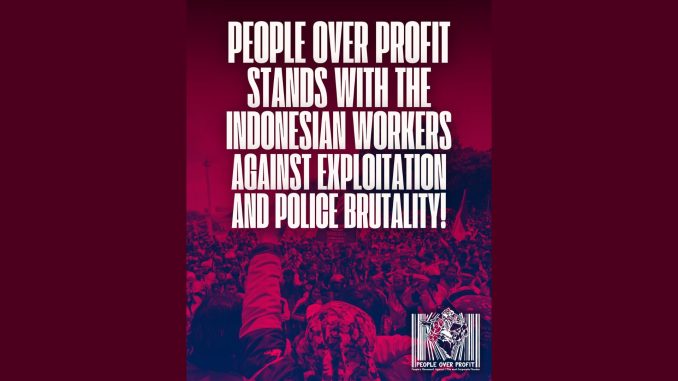
People Over Profit stands with the Indonesian workers against exploitation and police brutality!
The People Over Profit Network extends our condolences to the family of Affan Kurniawan, an online motorbike taxi driver who was run over to death by the Indonesian riot police during the nationwide protest against worsening economic conditions and the government’s complicity.
As the global economic crisis under neoliberalism intensifies, workers everywhere are shouldering the greatest burden. This is especially true for workers in Global South countries like Indonesia. In Indonesia, one way this crisis materialized in policy is in the neoliberal Omnibus Law on Job Creation that was passed by the House of Representatives in October 2020. Because of this law, aimed at attracting foreign investors, workers no longer enjoy the already minimum protections they once had; sectoral minimum wages, the eight-hour workday and five-day workweek limit, and the right to a permanent contract after three years of casual employment are all no longer protected. With wages pushed down and protections stripped away, Indonesian workers are working more hours and, often, more jobs just to get by.
As the means of livelihood shrink, workers in Indonesia are also faced with budget cuts in vital public services like social housing, healthcare, and education due to Prabowo’s efficiency policy. As a response, workers, together with students, took to the streets in February 2025 to protest this policy, which opens the door to privatization and investment by private companies.
Adding to these austerity measures are the recent steep tax hikes, the annual property tax on land and buildings being one of them. In Pati, Central Java, the property tax was increased by 250%, resulting in thousands of Pati residents taking to the streets in mid-August and holding one of the biggest protests in Indonesia this year. This property tax increase goes up to 1000% in Jombang, East Java.
In the midst of this, however, members of the House of Representatives are getting an increased monthly housing allowance of 3000USD, 10 times the average minimum wage. As if the heightening prices of basic goods due to inflation is not enough to make surviving difficult, workers in Indonesia are further exploited in every way possible and squeezed out to their very last drop. They are losing their livelihood, every day facing the threat of hunger, houselessness, and poverty.
Hundreds of thousands of workers have lost their jobs since the Omnibus Law on Job Creation was passed, with over 24 thousand workers laid off this year alone. Given this, the pronounced presence of online motorbike taxi drivers in the recent protests is of no surprise, considering the pervasive trend of work informalization over the past decade which leaves workers with no social protection – a reflection of the deepening exploitation under the neoliberal system, an economic order that consistently prioritizes profit over people.
Despite multiple nationwide protests this year alone, the government has offered no meaningful response, opting instead to crush demonstrations with police violence and laying bare its collusion with corporate interests. The apparent brutality in these recent protests is nothing new; it is part of a long history of state repression against workers. With the killing of Affan Kurniawan, however, this latest wave of state violence during demonstrations has escalated to a deadly level. It is a glaring proof of a system that sees workers’ lives as expendable.
Instead of raising wages and protecting workers, the government continues to impose neoliberal policies and austerity measures that push people deeper into poverty, all while those in power seek to further fatten their own pockets by increasing their perks. For workers in Indonesia, protesting is a matter of survival and a just struggle to defend their livelihood.
As we mourn the death of Affan Kurniawan, we also honor the countless workers whose lives are stolen in silence by hunger, poverty, and exploitation – a systemic killing carried out in the name of corporate plunder and made possible by governments that serve the wealthy few.
The recent protests highlight the powerful solidarity between all workers in Indonesia, both formal and informal, united in their struggle for justice. We stand with those who take to the streets despite repression, and with all workers across Indonesia in their just struggle against police brutality and exploitation, their struggle to demand people over profit.
